Legal Issues in Business Organizations: Effects of Company Law, Employment Law, and Contract Law
VerifiedAdded on 2022/11/25
|8
|2665
|350
AI Summary
This essay examines the effects of company law, employment law, and contract law on businesses in the UK. It discusses the regulations and their impact on business prospects, including the responsibilities of company directors, rights and obligations of employees, and the importance of well-drafted contracts. The essay also highlights the skills and abilities developed while working on this topic.
Contribute Materials
Your contribution can guide someone’s learning journey. Share your
documents today.

Legal Issues in
Business
Organizations Tourism
and Events
Organizations
Assessment for 2021
Business
Organizations Tourism
and Events
Organizations
Assessment for 2021
Secure Best Marks with AI Grader
Need help grading? Try our AI Grader for instant feedback on your assignments.
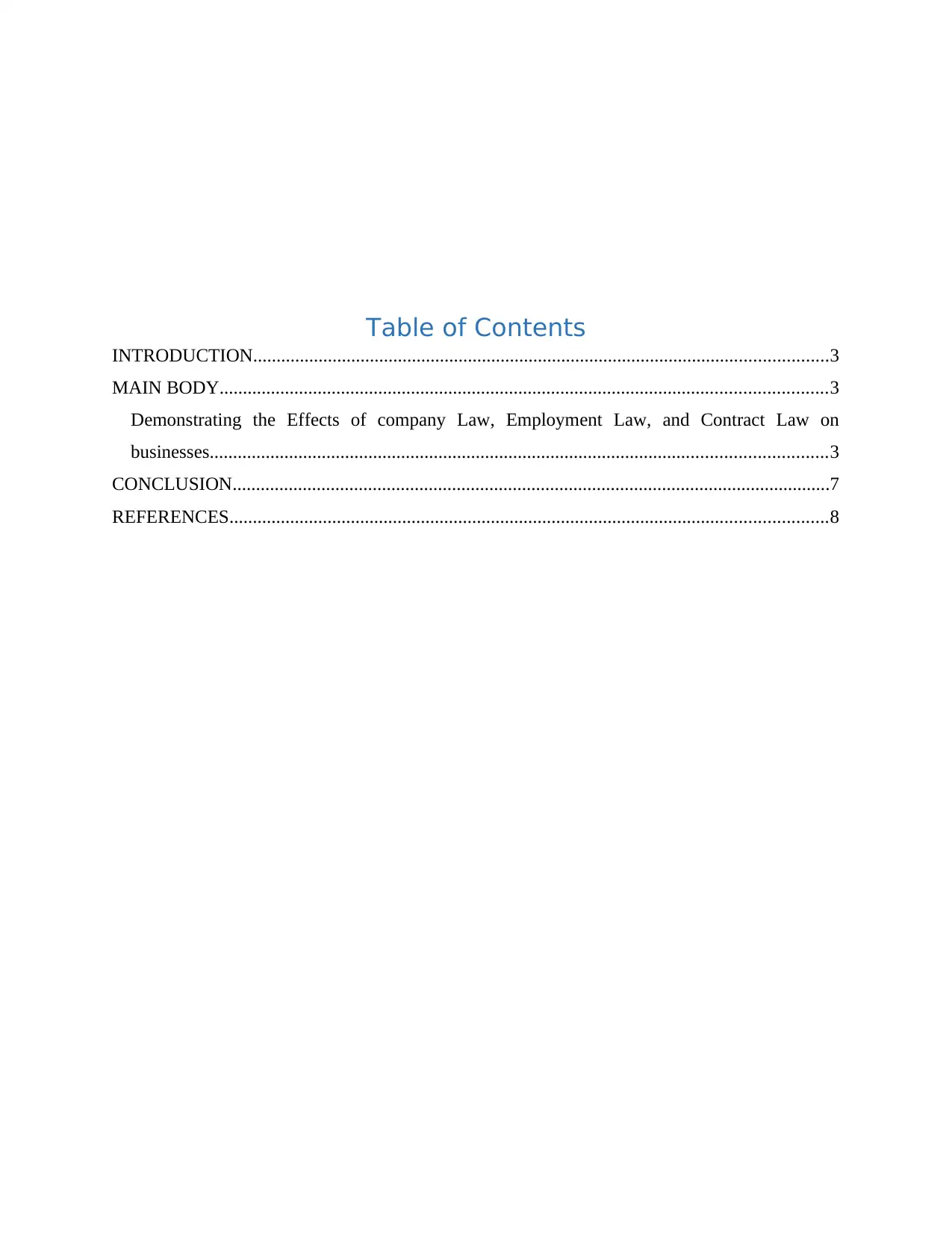
Table of Contents
INTRODUCTION...........................................................................................................................3
MAIN BODY..................................................................................................................................3
Demonstrating the Effects of company Law, Employment Law, and Contract Law on
businesses....................................................................................................................................3
CONCLUSION................................................................................................................................7
REFERENCES................................................................................................................................8
INTRODUCTION...........................................................................................................................3
MAIN BODY..................................................................................................................................3
Demonstrating the Effects of company Law, Employment Law, and Contract Law on
businesses....................................................................................................................................3
CONCLUSION................................................................................................................................7
REFERENCES................................................................................................................................8
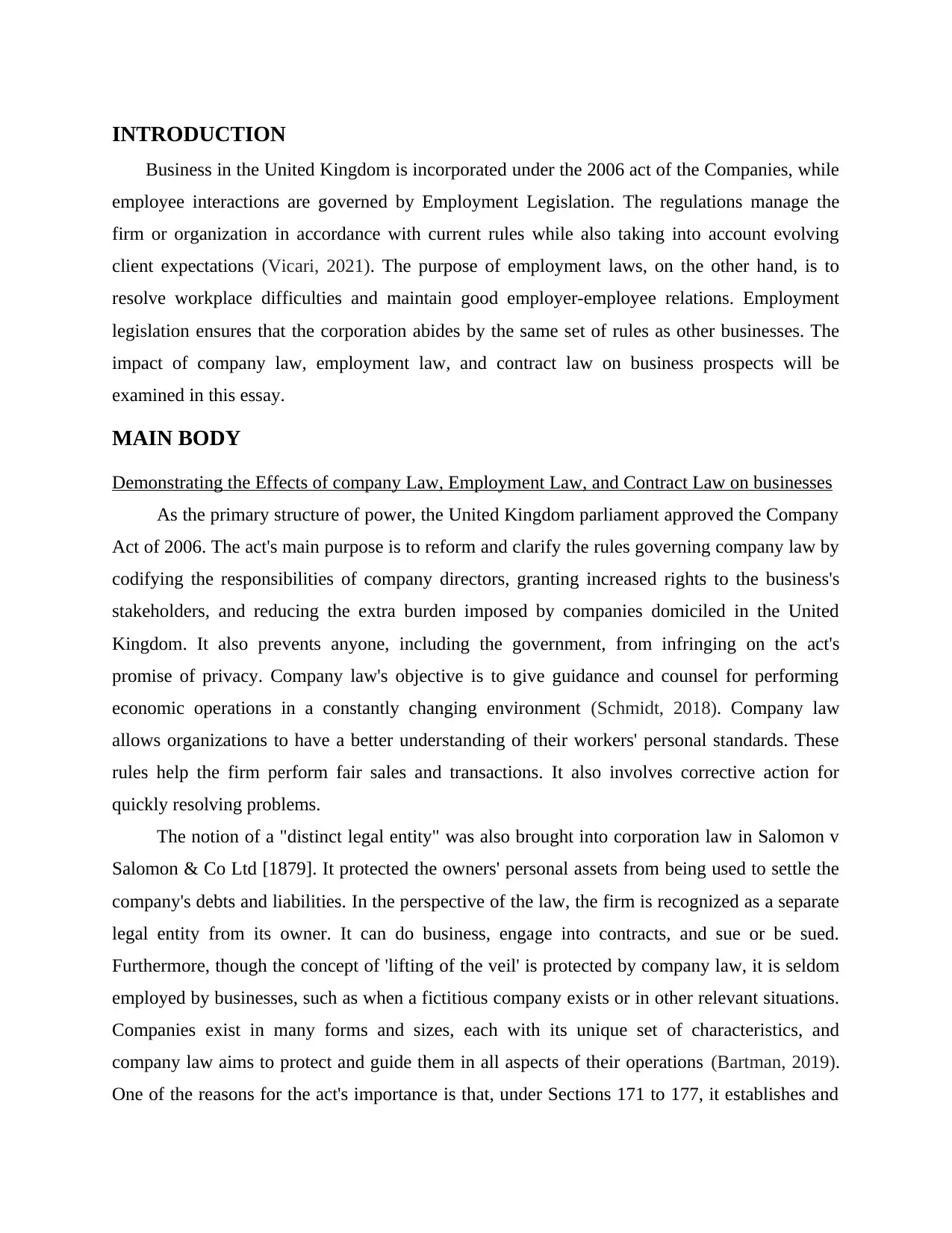
INTRODUCTION
Business in the United Kingdom is incorporated under the 2006 act of the Companies, while
employee interactions are governed by Employment Legislation. The regulations manage the
firm or organization in accordance with current rules while also taking into account evolving
client expectations (Vicari, 2021). The purpose of employment laws, on the other hand, is to
resolve workplace difficulties and maintain good employer-employee relations. Employment
legislation ensures that the corporation abides by the same set of rules as other businesses. The
impact of company law, employment law, and contract law on business prospects will be
examined in this essay.
MAIN BODY
Demonstrating the Effects of company Law, Employment Law, and Contract Law on businesses
As the primary structure of power, the United Kingdom parliament approved the Company
Act of 2006. The act's main purpose is to reform and clarify the rules governing company law by
codifying the responsibilities of company directors, granting increased rights to the business's
stakeholders, and reducing the extra burden imposed by companies domiciled in the United
Kingdom. It also prevents anyone, including the government, from infringing on the act's
promise of privacy. Company law's objective is to give guidance and counsel for performing
economic operations in a constantly changing environment (Schmidt, 2018). Company law
allows organizations to have a better understanding of their workers' personal standards. These
rules help the firm perform fair sales and transactions. It also involves corrective action for
quickly resolving problems.
The notion of a "distinct legal entity" was also brought into corporation law in Salomon v
Salomon & Co Ltd [1879]. It protected the owners' personal assets from being used to settle the
company's debts and liabilities. In the perspective of the law, the firm is recognized as a separate
legal entity from its owner. It can do business, engage into contracts, and sue or be sued.
Furthermore, though the concept of 'lifting of the veil' is protected by company law, it is seldom
employed by businesses, such as when a fictitious company exists or in other relevant situations.
Companies exist in many forms and sizes, each with its unique set of characteristics, and
company law aims to protect and guide them in all aspects of their operations (Bartman, 2019).
One of the reasons for the act's importance is that, under Sections 171 to 177, it establishes and
Business in the United Kingdom is incorporated under the 2006 act of the Companies, while
employee interactions are governed by Employment Legislation. The regulations manage the
firm or organization in accordance with current rules while also taking into account evolving
client expectations (Vicari, 2021). The purpose of employment laws, on the other hand, is to
resolve workplace difficulties and maintain good employer-employee relations. Employment
legislation ensures that the corporation abides by the same set of rules as other businesses. The
impact of company law, employment law, and contract law on business prospects will be
examined in this essay.
MAIN BODY
Demonstrating the Effects of company Law, Employment Law, and Contract Law on businesses
As the primary structure of power, the United Kingdom parliament approved the Company
Act of 2006. The act's main purpose is to reform and clarify the rules governing company law by
codifying the responsibilities of company directors, granting increased rights to the business's
stakeholders, and reducing the extra burden imposed by companies domiciled in the United
Kingdom. It also prevents anyone, including the government, from infringing on the act's
promise of privacy. Company law's objective is to give guidance and counsel for performing
economic operations in a constantly changing environment (Schmidt, 2018). Company law
allows organizations to have a better understanding of their workers' personal standards. These
rules help the firm perform fair sales and transactions. It also involves corrective action for
quickly resolving problems.
The notion of a "distinct legal entity" was also brought into corporation law in Salomon v
Salomon & Co Ltd [1879]. It protected the owners' personal assets from being used to settle the
company's debts and liabilities. In the perspective of the law, the firm is recognized as a separate
legal entity from its owner. It can do business, engage into contracts, and sue or be sued.
Furthermore, though the concept of 'lifting of the veil' is protected by company law, it is seldom
employed by businesses, such as when a fictitious company exists or in other relevant situations.
Companies exist in many forms and sizes, each with its unique set of characteristics, and
company law aims to protect and guide them in all aspects of their operations (Bartman, 2019).
One of the reasons for the act's importance is that, under Sections 171 to 177, it establishes and
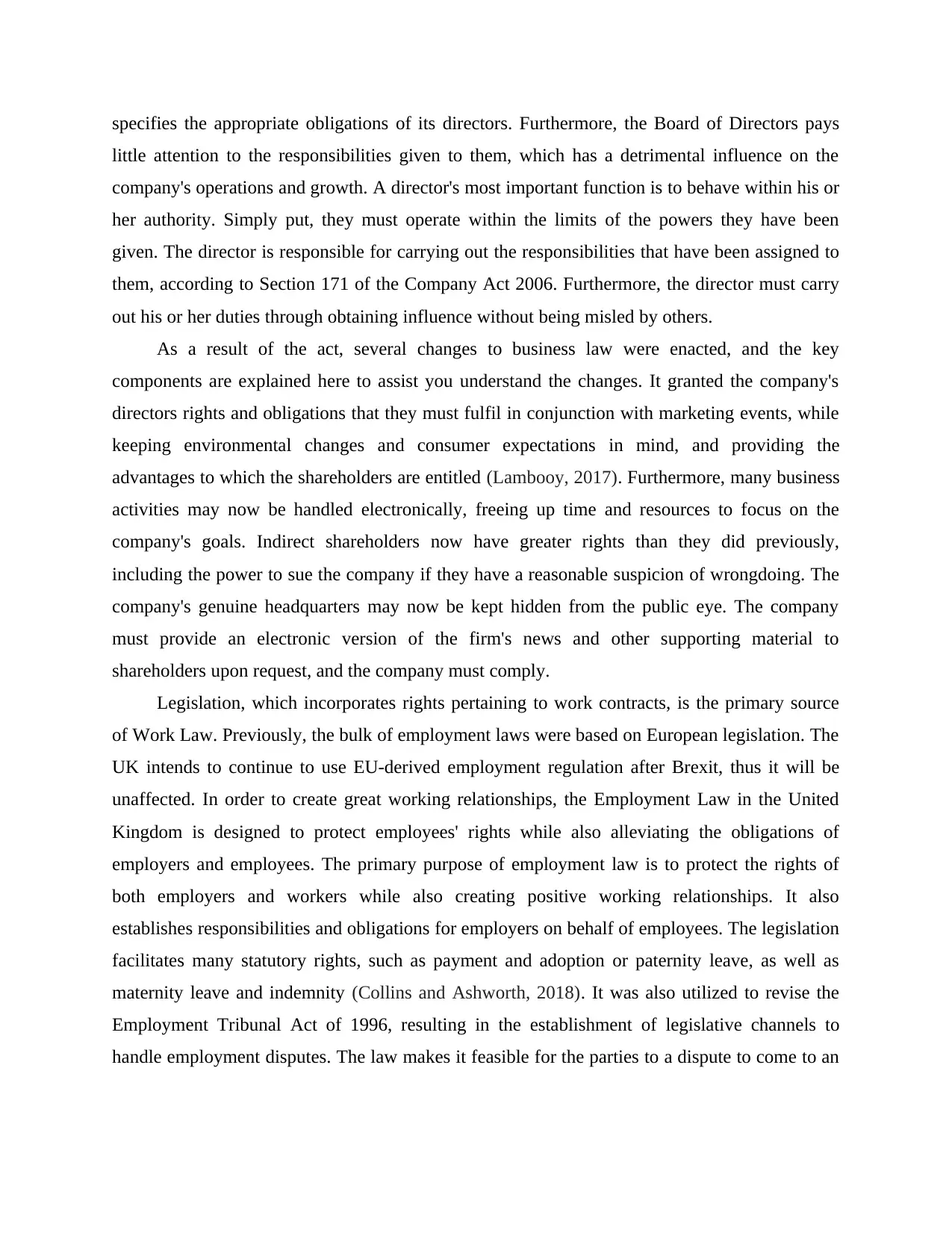
specifies the appropriate obligations of its directors. Furthermore, the Board of Directors pays
little attention to the responsibilities given to them, which has a detrimental influence on the
company's operations and growth. A director's most important function is to behave within his or
her authority. Simply put, they must operate within the limits of the powers they have been
given. The director is responsible for carrying out the responsibilities that have been assigned to
them, according to Section 171 of the Company Act 2006. Furthermore, the director must carry
out his or her duties through obtaining influence without being misled by others.
As a result of the act, several changes to business law were enacted, and the key
components are explained here to assist you understand the changes. It granted the company's
directors rights and obligations that they must fulfil in conjunction with marketing events, while
keeping environmental changes and consumer expectations in mind, and providing the
advantages to which the shareholders are entitled (Lambooy, 2017). Furthermore, many business
activities may now be handled electronically, freeing up time and resources to focus on the
company's goals. Indirect shareholders now have greater rights than they did previously,
including the power to sue the company if they have a reasonable suspicion of wrongdoing. The
company's genuine headquarters may now be kept hidden from the public eye. The company
must provide an electronic version of the firm's news and other supporting material to
shareholders upon request, and the company must comply.
Legislation, which incorporates rights pertaining to work contracts, is the primary source
of Work Law. Previously, the bulk of employment laws were based on European legislation. The
UK intends to continue to use EU-derived employment regulation after Brexit, thus it will be
unaffected. In order to create great working relationships, the Employment Law in the United
Kingdom is designed to protect employees' rights while also alleviating the obligations of
employers and employees. The primary purpose of employment law is to protect the rights of
both employers and workers while also creating positive working relationships. It also
establishes responsibilities and obligations for employers on behalf of employees. The legislation
facilitates many statutory rights, such as payment and adoption or paternity leave, as well as
maternity leave and indemnity (Collins and Ashworth, 2018). It was also utilized to revise the
Employment Tribunal Act of 1996, resulting in the establishment of legislative channels to
handle employment disputes. The law makes it feasible for the parties to a dispute to come to an
little attention to the responsibilities given to them, which has a detrimental influence on the
company's operations and growth. A director's most important function is to behave within his or
her authority. Simply put, they must operate within the limits of the powers they have been
given. The director is responsible for carrying out the responsibilities that have been assigned to
them, according to Section 171 of the Company Act 2006. Furthermore, the director must carry
out his or her duties through obtaining influence without being misled by others.
As a result of the act, several changes to business law were enacted, and the key
components are explained here to assist you understand the changes. It granted the company's
directors rights and obligations that they must fulfil in conjunction with marketing events, while
keeping environmental changes and consumer expectations in mind, and providing the
advantages to which the shareholders are entitled (Lambooy, 2017). Furthermore, many business
activities may now be handled electronically, freeing up time and resources to focus on the
company's goals. Indirect shareholders now have greater rights than they did previously,
including the power to sue the company if they have a reasonable suspicion of wrongdoing. The
company's genuine headquarters may now be kept hidden from the public eye. The company
must provide an electronic version of the firm's news and other supporting material to
shareholders upon request, and the company must comply.
Legislation, which incorporates rights pertaining to work contracts, is the primary source
of Work Law. Previously, the bulk of employment laws were based on European legislation. The
UK intends to continue to use EU-derived employment regulation after Brexit, thus it will be
unaffected. In order to create great working relationships, the Employment Law in the United
Kingdom is designed to protect employees' rights while also alleviating the obligations of
employers and employees. The primary purpose of employment law is to protect the rights of
both employers and workers while also creating positive working relationships. It also
establishes responsibilities and obligations for employers on behalf of employees. The legislation
facilitates many statutory rights, such as payment and adoption or paternity leave, as well as
maternity leave and indemnity (Collins and Ashworth, 2018). It was also utilized to revise the
Employment Tribunal Act of 1996, resulting in the establishment of legislative channels to
handle employment disputes. The law makes it feasible for the parties to a dispute to come to an
Secure Best Marks with AI Grader
Need help grading? Try our AI Grader for instant feedback on your assignments.
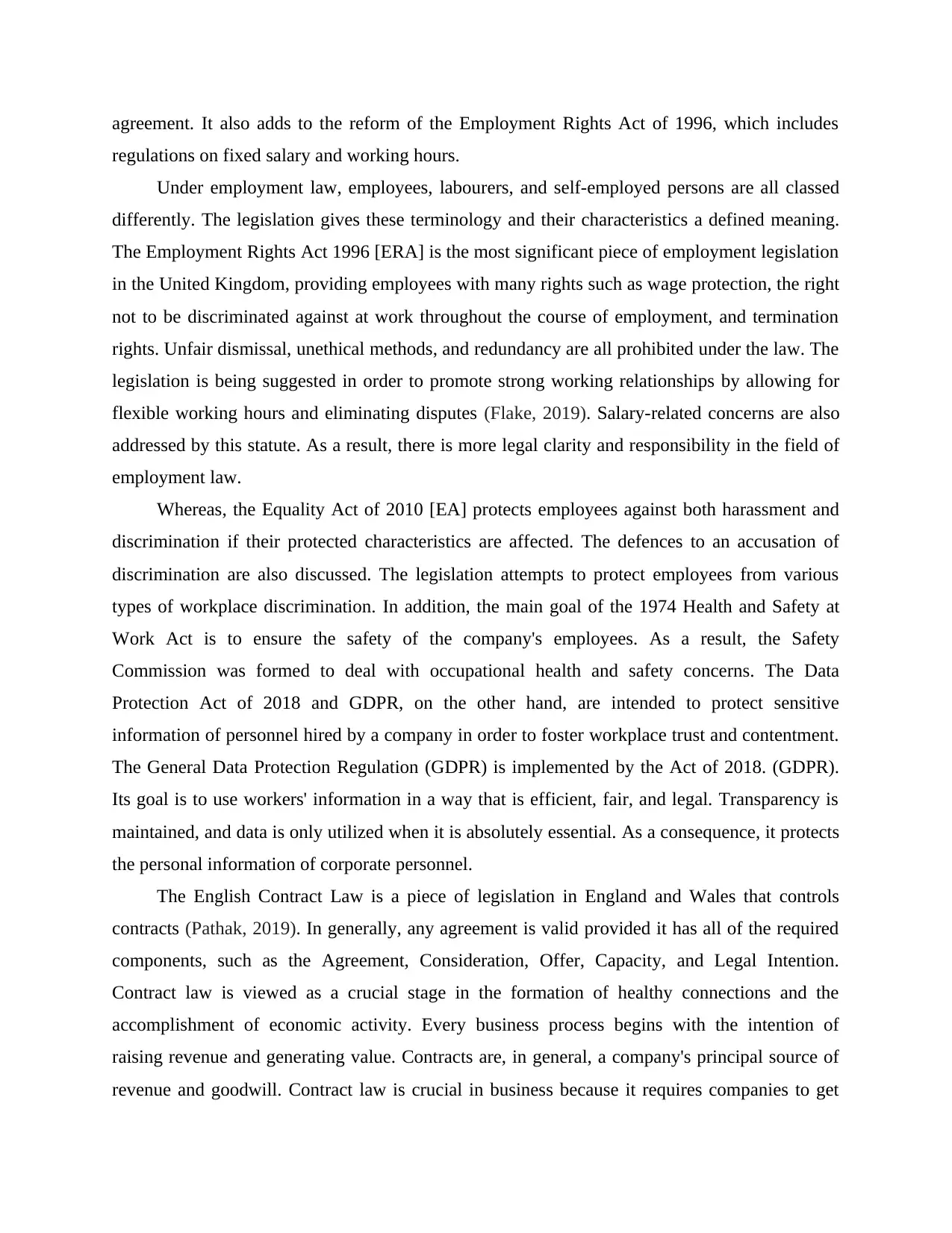
agreement. It also adds to the reform of the Employment Rights Act of 1996, which includes
regulations on fixed salary and working hours.
Under employment law, employees, labourers, and self-employed persons are all classed
differently. The legislation gives these terminology and their characteristics a defined meaning.
The Employment Rights Act 1996 [ERA] is the most significant piece of employment legislation
in the United Kingdom, providing employees with many rights such as wage protection, the right
not to be discriminated against at work throughout the course of employment, and termination
rights. Unfair dismissal, unethical methods, and redundancy are all prohibited under the law. The
legislation is being suggested in order to promote strong working relationships by allowing for
flexible working hours and eliminating disputes (Flake, 2019). Salary-related concerns are also
addressed by this statute. As a result, there is more legal clarity and responsibility in the field of
employment law.
Whereas, the Equality Act of 2010 [EA] protects employees against both harassment and
discrimination if their protected characteristics are affected. The defences to an accusation of
discrimination are also discussed. The legislation attempts to protect employees from various
types of workplace discrimination. In addition, the main goal of the 1974 Health and Safety at
Work Act is to ensure the safety of the company's employees. As a result, the Safety
Commission was formed to deal with occupational health and safety concerns. The Data
Protection Act of 2018 and GDPR, on the other hand, are intended to protect sensitive
information of personnel hired by a company in order to foster workplace trust and contentment.
The General Data Protection Regulation (GDPR) is implemented by the Act of 2018. (GDPR).
Its goal is to use workers' information in a way that is efficient, fair, and legal. Transparency is
maintained, and data is only utilized when it is absolutely essential. As a consequence, it protects
the personal information of corporate personnel.
The English Contract Law is a piece of legislation in England and Wales that controls
contracts (Pathak, 2019). In generally, any agreement is valid provided it has all of the required
components, such as the Agreement, Consideration, Offer, Capacity, and Legal Intention.
Contract law is viewed as a crucial stage in the formation of healthy connections and the
accomplishment of economic activity. Every business process begins with the intention of
raising revenue and generating value. Contracts are, in general, a company's principal source of
revenue and goodwill. Contract law is crucial in business because it requires companies to get
regulations on fixed salary and working hours.
Under employment law, employees, labourers, and self-employed persons are all classed
differently. The legislation gives these terminology and their characteristics a defined meaning.
The Employment Rights Act 1996 [ERA] is the most significant piece of employment legislation
in the United Kingdom, providing employees with many rights such as wage protection, the right
not to be discriminated against at work throughout the course of employment, and termination
rights. Unfair dismissal, unethical methods, and redundancy are all prohibited under the law. The
legislation is being suggested in order to promote strong working relationships by allowing for
flexible working hours and eliminating disputes (Flake, 2019). Salary-related concerns are also
addressed by this statute. As a result, there is more legal clarity and responsibility in the field of
employment law.
Whereas, the Equality Act of 2010 [EA] protects employees against both harassment and
discrimination if their protected characteristics are affected. The defences to an accusation of
discrimination are also discussed. The legislation attempts to protect employees from various
types of workplace discrimination. In addition, the main goal of the 1974 Health and Safety at
Work Act is to ensure the safety of the company's employees. As a result, the Safety
Commission was formed to deal with occupational health and safety concerns. The Data
Protection Act of 2018 and GDPR, on the other hand, are intended to protect sensitive
information of personnel hired by a company in order to foster workplace trust and contentment.
The General Data Protection Regulation (GDPR) is implemented by the Act of 2018. (GDPR).
Its goal is to use workers' information in a way that is efficient, fair, and legal. Transparency is
maintained, and data is only utilized when it is absolutely essential. As a consequence, it protects
the personal information of corporate personnel.
The English Contract Law is a piece of legislation in England and Wales that controls
contracts (Pathak, 2019). In generally, any agreement is valid provided it has all of the required
components, such as the Agreement, Consideration, Offer, Capacity, and Legal Intention.
Contract law is viewed as a crucial stage in the formation of healthy connections and the
accomplishment of economic activity. Every business process begins with the intention of
raising revenue and generating value. Contracts are, in general, a company's principal source of
revenue and goodwill. Contract law is crucial in business because it requires companies to get
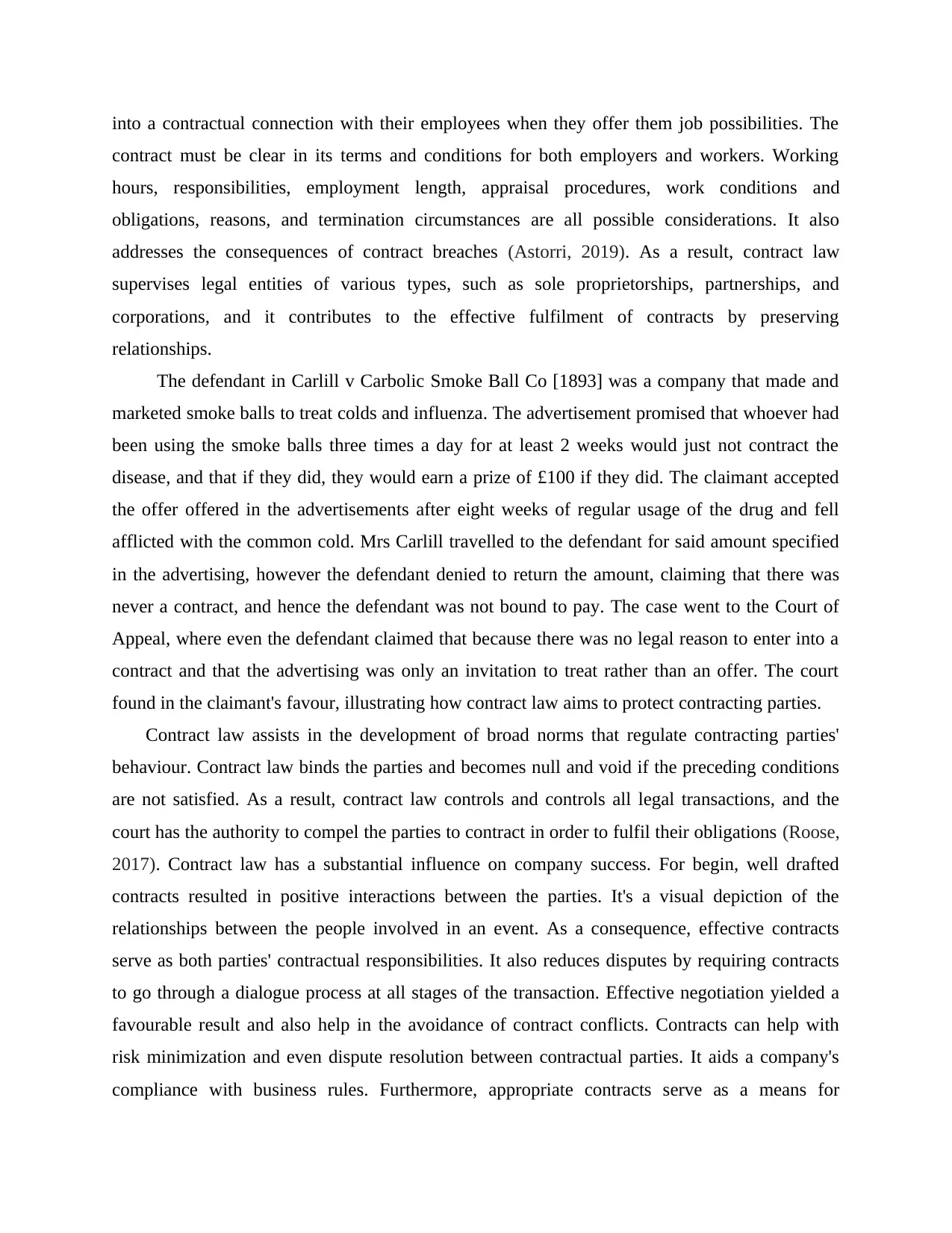
into a contractual connection with their employees when they offer them job possibilities. The
contract must be clear in its terms and conditions for both employers and workers. Working
hours, responsibilities, employment length, appraisal procedures, work conditions and
obligations, reasons, and termination circumstances are all possible considerations. It also
addresses the consequences of contract breaches (Astorri, 2019). As a result, contract law
supervises legal entities of various types, such as sole proprietorships, partnerships, and
corporations, and it contributes to the effective fulfilment of contracts by preserving
relationships.
The defendant in Carlill v Carbolic Smoke Ball Co [1893] was a company that made and
marketed smoke balls to treat colds and influenza. The advertisement promised that whoever had
been using the smoke balls three times a day for at least 2 weeks would just not contract the
disease, and that if they did, they would earn a prize of £100 if they did. The claimant accepted
the offer offered in the advertisements after eight weeks of regular usage of the drug and fell
afflicted with the common cold. Mrs Carlill travelled to the defendant for said amount specified
in the advertising, however the defendant denied to return the amount, claiming that there was
never a contract, and hence the defendant was not bound to pay. The case went to the Court of
Appeal, where even the defendant claimed that because there was no legal reason to enter into a
contract and that the advertising was only an invitation to treat rather than an offer. The court
found in the claimant's favour, illustrating how contract law aims to protect contracting parties.
Contract law assists in the development of broad norms that regulate contracting parties'
behaviour. Contract law binds the parties and becomes null and void if the preceding conditions
are not satisfied. As a result, contract law controls and controls all legal transactions, and the
court has the authority to compel the parties to contract in order to fulfil their obligations (Roose,
2017). Contract law has a substantial influence on company success. For begin, well drafted
contracts resulted in positive interactions between the parties. It's a visual depiction of the
relationships between the people involved in an event. As a consequence, effective contracts
serve as both parties' contractual responsibilities. It also reduces disputes by requiring contracts
to go through a dialogue process at all stages of the transaction. Effective negotiation yielded a
favourable result and also help in the avoidance of contract conflicts. Contracts can help with
risk minimization and even dispute resolution between contractual parties. It aids a company's
compliance with business rules. Furthermore, appropriate contracts serve as a means for
contract must be clear in its terms and conditions for both employers and workers. Working
hours, responsibilities, employment length, appraisal procedures, work conditions and
obligations, reasons, and termination circumstances are all possible considerations. It also
addresses the consequences of contract breaches (Astorri, 2019). As a result, contract law
supervises legal entities of various types, such as sole proprietorships, partnerships, and
corporations, and it contributes to the effective fulfilment of contracts by preserving
relationships.
The defendant in Carlill v Carbolic Smoke Ball Co [1893] was a company that made and
marketed smoke balls to treat colds and influenza. The advertisement promised that whoever had
been using the smoke balls three times a day for at least 2 weeks would just not contract the
disease, and that if they did, they would earn a prize of £100 if they did. The claimant accepted
the offer offered in the advertisements after eight weeks of regular usage of the drug and fell
afflicted with the common cold. Mrs Carlill travelled to the defendant for said amount specified
in the advertising, however the defendant denied to return the amount, claiming that there was
never a contract, and hence the defendant was not bound to pay. The case went to the Court of
Appeal, where even the defendant claimed that because there was no legal reason to enter into a
contract and that the advertising was only an invitation to treat rather than an offer. The court
found in the claimant's favour, illustrating how contract law aims to protect contracting parties.
Contract law assists in the development of broad norms that regulate contracting parties'
behaviour. Contract law binds the parties and becomes null and void if the preceding conditions
are not satisfied. As a result, contract law controls and controls all legal transactions, and the
court has the authority to compel the parties to contract in order to fulfil their obligations (Roose,
2017). Contract law has a substantial influence on company success. For begin, well drafted
contracts resulted in positive interactions between the parties. It's a visual depiction of the
relationships between the people involved in an event. As a consequence, effective contracts
serve as both parties' contractual responsibilities. It also reduces disputes by requiring contracts
to go through a dialogue process at all stages of the transaction. Effective negotiation yielded a
favourable result and also help in the avoidance of contract conflicts. Contracts can help with
risk minimization and even dispute resolution between contractual parties. It aids a company's
compliance with business rules. Furthermore, appropriate contracts serve as a means for
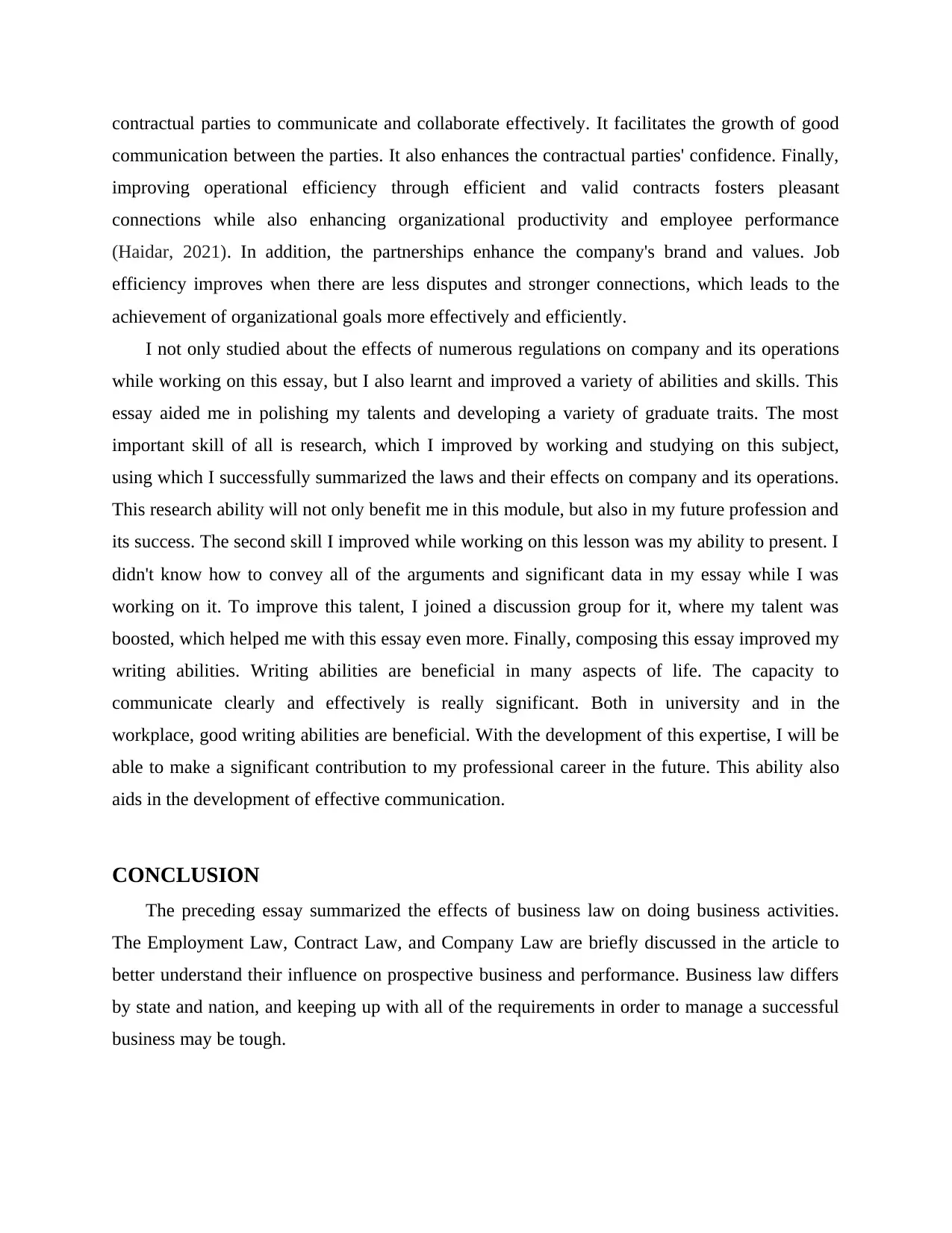
contractual parties to communicate and collaborate effectively. It facilitates the growth of good
communication between the parties. It also enhances the contractual parties' confidence. Finally,
improving operational efficiency through efficient and valid contracts fosters pleasant
connections while also enhancing organizational productivity and employee performance
(Haidar, 2021). In addition, the partnerships enhance the company's brand and values. Job
efficiency improves when there are less disputes and stronger connections, which leads to the
achievement of organizational goals more effectively and efficiently.
I not only studied about the effects of numerous regulations on company and its operations
while working on this essay, but I also learnt and improved a variety of abilities and skills. This
essay aided me in polishing my talents and developing a variety of graduate traits. The most
important skill of all is research, which I improved by working and studying on this subject,
using which I successfully summarized the laws and their effects on company and its operations.
This research ability will not only benefit me in this module, but also in my future profession and
its success. The second skill I improved while working on this lesson was my ability to present. I
didn't know how to convey all of the arguments and significant data in my essay while I was
working on it. To improve this talent, I joined a discussion group for it, where my talent was
boosted, which helped me with this essay even more. Finally, composing this essay improved my
writing abilities. Writing abilities are beneficial in many aspects of life. The capacity to
communicate clearly and effectively is really significant. Both in university and in the
workplace, good writing abilities are beneficial. With the development of this expertise, I will be
able to make a significant contribution to my professional career in the future. This ability also
aids in the development of effective communication.
CONCLUSION
The preceding essay summarized the effects of business law on doing business activities.
The Employment Law, Contract Law, and Company Law are briefly discussed in the article to
better understand their influence on prospective business and performance. Business law differs
by state and nation, and keeping up with all of the requirements in order to manage a successful
business may be tough.
communication between the parties. It also enhances the contractual parties' confidence. Finally,
improving operational efficiency through efficient and valid contracts fosters pleasant
connections while also enhancing organizational productivity and employee performance
(Haidar, 2021). In addition, the partnerships enhance the company's brand and values. Job
efficiency improves when there are less disputes and stronger connections, which leads to the
achievement of organizational goals more effectively and efficiently.
I not only studied about the effects of numerous regulations on company and its operations
while working on this essay, but I also learnt and improved a variety of abilities and skills. This
essay aided me in polishing my talents and developing a variety of graduate traits. The most
important skill of all is research, which I improved by working and studying on this subject,
using which I successfully summarized the laws and their effects on company and its operations.
This research ability will not only benefit me in this module, but also in my future profession and
its success. The second skill I improved while working on this lesson was my ability to present. I
didn't know how to convey all of the arguments and significant data in my essay while I was
working on it. To improve this talent, I joined a discussion group for it, where my talent was
boosted, which helped me with this essay even more. Finally, composing this essay improved my
writing abilities. Writing abilities are beneficial in many aspects of life. The capacity to
communicate clearly and effectively is really significant. Both in university and in the
workplace, good writing abilities are beneficial. With the development of this expertise, I will be
able to make a significant contribution to my professional career in the future. This ability also
aids in the development of effective communication.
CONCLUSION
The preceding essay summarized the effects of business law on doing business activities.
The Employment Law, Contract Law, and Company Law are briefly discussed in the article to
better understand their influence on prospective business and performance. Business law differs
by state and nation, and keeping up with all of the requirements in order to manage a successful
business may be tough.
Paraphrase This Document
Need a fresh take? Get an instant paraphrase of this document with our AI Paraphraser
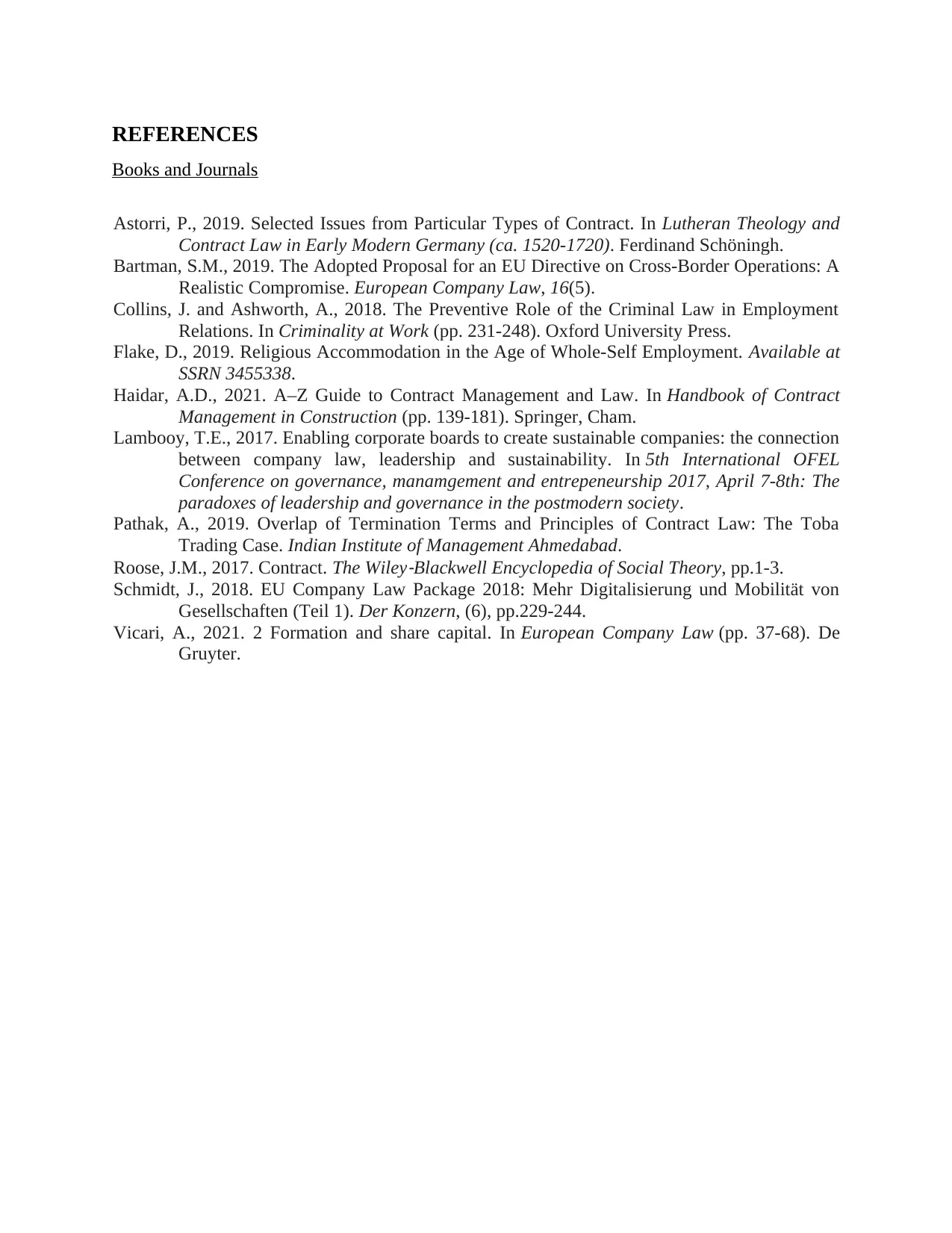
REFERENCES
Books and Journals
Astorri, P., 2019. Selected Issues from Particular Types of Contract. In Lutheran Theology and
Contract Law in Early Modern Germany (ca. 1520-1720). Ferdinand Schöningh.
Bartman, S.M., 2019. The Adopted Proposal for an EU Directive on Cross-Border Operations: A
Realistic Compromise. European Company Law, 16(5).
Collins, J. and Ashworth, A., 2018. The Preventive Role of the Criminal Law in Employment
Relations. In Criminality at Work (pp. 231-248). Oxford University Press.
Flake, D., 2019. Religious Accommodation in the Age of Whole-Self Employment. Available at
SSRN 3455338.
Haidar, A.D., 2021. A–Z Guide to Contract Management and Law. In Handbook of Contract
Management in Construction (pp. 139-181). Springer, Cham.
Lambooy, T.E., 2017. Enabling corporate boards to create sustainable companies: the connection
between company law, leadership and sustainability. In 5th International OFEL
Conference on governance, manamgement and entrepeneurship 2017, April 7-8th: The
paradoxes of leadership and governance in the postmodern society.
Pathak, A., 2019. Overlap of Termination Terms and Principles of Contract Law: The Toba
Trading Case. Indian Institute of Management Ahmedabad.
Roose, J.M., 2017. Contract. The Wiley
‐Blackwell Encyclopedia of Social Theory, pp.1-3.
Schmidt, J., 2018. EU Company Law Package 2018: Mehr Digitalisierung und Mobilität von
Gesellschaften (Teil 1). Der Konzern, (6), pp.229-244.
Vicari, A., 2021. 2 Formation and share capital. In European Company Law (pp. 37-68). De
Gruyter.
Books and Journals
Astorri, P., 2019. Selected Issues from Particular Types of Contract. In Lutheran Theology and
Contract Law in Early Modern Germany (ca. 1520-1720). Ferdinand Schöningh.
Bartman, S.M., 2019. The Adopted Proposal for an EU Directive on Cross-Border Operations: A
Realistic Compromise. European Company Law, 16(5).
Collins, J. and Ashworth, A., 2018. The Preventive Role of the Criminal Law in Employment
Relations. In Criminality at Work (pp. 231-248). Oxford University Press.
Flake, D., 2019. Religious Accommodation in the Age of Whole-Self Employment. Available at
SSRN 3455338.
Haidar, A.D., 2021. A–Z Guide to Contract Management and Law. In Handbook of Contract
Management in Construction (pp. 139-181). Springer, Cham.
Lambooy, T.E., 2017. Enabling corporate boards to create sustainable companies: the connection
between company law, leadership and sustainability. In 5th International OFEL
Conference on governance, manamgement and entrepeneurship 2017, April 7-8th: The
paradoxes of leadership and governance in the postmodern society.
Pathak, A., 2019. Overlap of Termination Terms and Principles of Contract Law: The Toba
Trading Case. Indian Institute of Management Ahmedabad.
Roose, J.M., 2017. Contract. The Wiley
‐Blackwell Encyclopedia of Social Theory, pp.1-3.
Schmidt, J., 2018. EU Company Law Package 2018: Mehr Digitalisierung und Mobilität von
Gesellschaften (Teil 1). Der Konzern, (6), pp.229-244.
Vicari, A., 2021. 2 Formation and share capital. In European Company Law (pp. 37-68). De
Gruyter.
1 out of 8
Related Documents
Your All-in-One AI-Powered Toolkit for Academic Success.
+13062052269
info@desklib.com
Available 24*7 on WhatsApp / Email
![[object Object]](/_next/static/media/star-bottom.7253800d.svg)
Unlock your academic potential
© 2024 | Zucol Services PVT LTD | All rights reserved.




